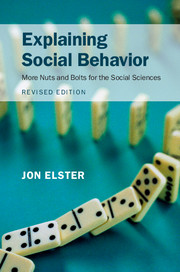9 - Transmutations
from II - The Mind
Published online by Cambridge University Press: 05 August 2015
Summary
We are usually conscious of our desires and emotions. There are exceptions, to which I have referred and to which I shall refer again, but by and large these motivations operate in full transparency and with full awareness. By contrast, the motivations I shall refer to as (mental) needs operate “behind the back” of the agent. He is unaware of them, and might deplore or resist their operation if he were aware of them. In the present chapter I catalogue and illustrate some of these needs and their effects. The term “transmutation” refers to the alchemy-like character of some of the operations I shall describe, not only the turning of lead into gold (“sweet lemons”), but also of gold into lead (“sour grapes”). Some operations also involve the creation of new mental states out of whole cloth. Although I have discussed some of these processes in earlier chapters and shall discuss others in later ones, I consider them together here to present a (relatively) full picture.
The needs have causal efficacy because, when unsatisfied, they induce some kind of psychic discomfort that can be alleviated only by a mental alchemy. To verify this operation, which is unobservable in itself, we must consider the implications for observable facts, along the lines of the explanation of standing ovations on Broadway that appealed to the need for the reduction of cognitive dissonance (Chapter 1).
Let me first list the needs to be discussed, with in some cases the names of their foremost expositors:
the need to justify one's choices by good reasons (Otto Neurath);
the need for cognitive consonance (Leon Festinger);
the need to believe that the world has meaning and order;
the need for autonomy (Jack Brehm);
the need for novelty;
the need to maintain one's amour-propre (La Rochefoucauld);
the need to see oneself as guided by a motivation that is highly ranked
in the hierarchy of motivations (Proust).
introduce these ideas, I offer a concocted example. Suppose I am very vain, but fool myself into thinking that I am not. La Bruyére said that “Men are very vain, and hate to be seen as such.” He probably meant seen by others, but one may reasonably extend his idea to an aversion to be seen as vain by oneself.
Information
- Type
- Chapter
- Information
- Explaining Social BehaviorMore Nuts and Bolts for the Social Sciences, pp. 159 - 186Publisher: Cambridge University PressPrint publication year: 2015
